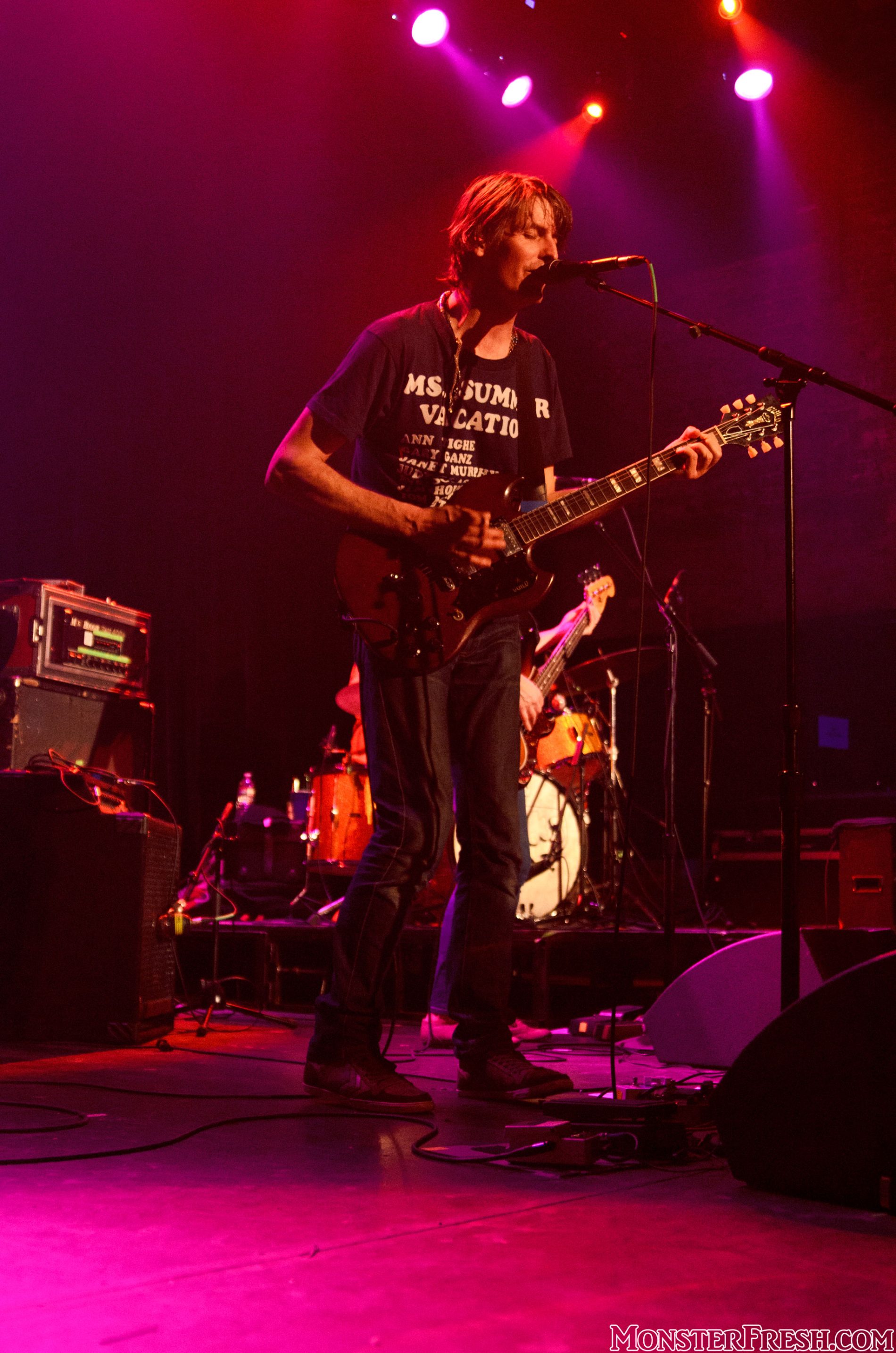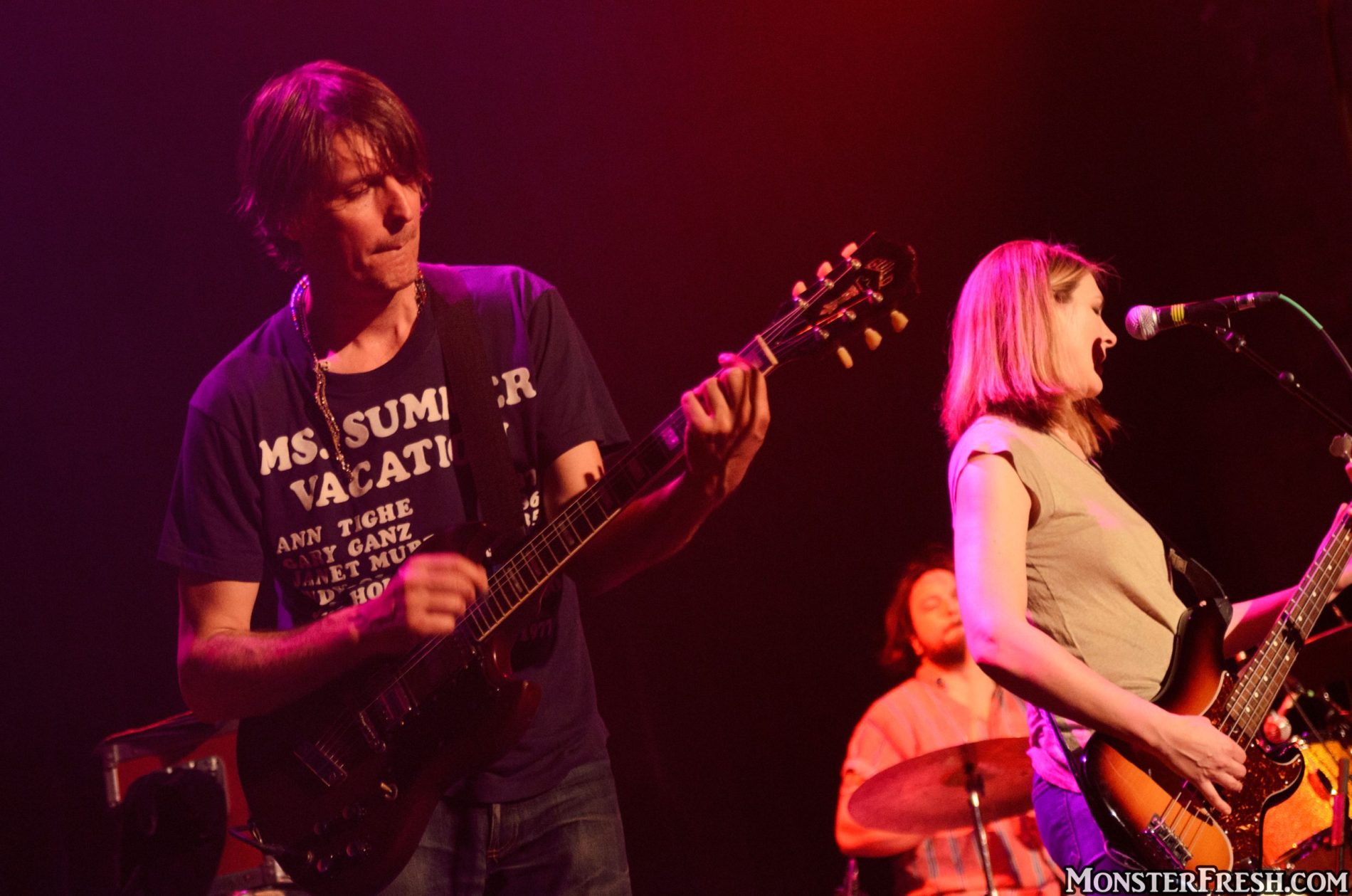“Sensitive Euro Man” – Interview with Stephen Malkmus
A week before his latest album Wigout At Jagbags was released, I spoke with Jicks frontman Stephen Malkmus about music, Ice Cream, Berlin, & the Grateful Dead

This interview was conducted on the afternoon of December 31st 2013 and originally posted, with a slightly different edit, in the Spring 2014 issue (#37) of Ghettoblaster Magazine, which can be purchased HERE
Over the last 25 years, Stephen Malkmus has proven himself to be one of the most consistent songwriters in modern history, while remaining one of most consistently overlooked. Since dissolving the pioneering indie rock outfit, Pavement, in 1999, SM has put out one remarkable release after the other; each markedly different from the last. On Wig Out At Jagbags, the latest effort with his band, The Jicks, there are traces of everything that’s led up to it, from bright sunny choruses to dark, tangential, psychedelic, pathways. Wig Out is a demonstration of how well-rounded the guitarist has become, and the depth of the arsenal that he’s able to draw upon, at will; never capsizing the melody. Some people are trapped in the past, but Malkmus isn’t one of them, and this new album continues to make a solid case for his post-Pavement work as being some of the strongest of his career. The answer to his longevity is simple: he has the songs.
Highly prolific, yet widely labeled the “quintessential slacker,” SM has always embodied a similar duality. He’s a shambolic, irreverent, wisecracker with impeccable guitar lines, a knack for song structure, and a dedication to melody. He rejects strongly defined, tightly crafted verses for soft-focused ambiguity, yet regularly produces some of the most cutting and memorable lyrics that you’re likely to come across.
On the last day of 2013, I got Stephen on the phone to discuss such topics as the new album, living in Berlin for the past 2 years, and hippies with carrot juicers; discovering that, regardless of being notorious for his snark and dismissive nature, he’s actually as authentic and straightforward as any figure that I’ve had the pleasure of speaking with.

DEAD C:
How’re you doing?
STEPHEN MALKMUS:
Pretty good.
You got any fancy New Year’s plans tonight?
No. We’re laying low. But, we’re here, right now, in a winter wonderland of Sun Valley, Idaho. You ever been there?
No, I haven’t.
Really nice. I mean, it’s like ice-skating, cross-country skiing, downhill… all the fun, frivolous sports of the ruling class. We love it.
Did you spend the holidays down there, or did you just head down?
Yeah, my parents retired here 23 years ago, so we came up to see ‘em. It’s awesome. Then we’re going back to Portland today — right now, but we won’t get back ‘til 8. What are you doing? Are you in Seattle? What are you gonna do tonight? Gonna go see a band?
No. I don’t know what I’m doing. I’ve got a kid, too, so things kind of change.
Oh yeah. New Years is amateur night anyway, isn’t it?
Actually, speaking of Idaho, I just saw Built to Spill again on Saturday, and they’ve been doing a cover of [Pavement’s] “Here” lately.
Oh, really? That’s cool.
Did you know about that?
No, but they’re playing in Portland this week, for 3 days. I remember seeing that before we left. Tonight, they’re playing.
Have you ever done covers of any of Doug [Martsch]’s songs?
I would. You know, I’ll never forget when — is it Perfect From Now On; the one that has like, * singing * “I can’t get that song [sic] out of my head”?
Yeah.
That one. When that album came out, it was just so great. And Pavement had an album coming out too — I don’t remember if it was Terror Twilight, or the other one — but I was like, “Man, this is so much better than our album.” * laughs * I couldn’t believe it. I was like, “This is so great.”
Have you been back in the US very long?
About 2 months. It’s been pretty fun, but we’re fully in, kind of, parent mode; school, and getting used to that kind of stuff. That’s what it’s been more about. Noticing differences between Germany and America.
Is there anything that you miss? My friend Cindy (Wonderful) lived out there and she says that she misses club maté and aspirin complex.
Some of, just food places I miss. Even though it’s not known for food, there’s some kind of Arabic food and Thai places that were sort of fun. And then, just biking around on the wide sidewalk. You can ride with your kids on the sidewalks and it’s really safe. You can just cruise around anywhere. And just the general sort of slackness of the whole place. It’s real empty and spread out. I don’t know. And just the basic sense of discovery, which you don’t have when you’re back in your same old town.
I noticed that the “Lariat” video has French subtitles and “Tigers,” in its own way, had some captions in the video. Has living over in a country that’s primarily speaking German, affected your views on communication, in general — just the way people communicate, and how you communicated?
Yeah, well… I don’t know. I learned, basically, that you can get away with just speaking English, unless you want to get a job. In Berlin, it’s become an international city with the EU, and there’s tons of people from every European country; not to mention America and Australia. Actually, there’s a lot of Australians. So, communication is pretty much dominated by our language.
You know, what I learned more was that other nations are much more silent than us. We talk a lot more about nothing and we do it loudly. I notice it coming from my own mouth, but then, even after 2 years there, we, kind of, got quieter. And then, when I got on the plane back home, I was like, “Aww! There’s all this noise pollution.” You know, empty conversation. When you hear it in German, they speak in a low voice and you can’t understand it, so it just kind of turns into a * makes a mumbling sound *. It’s real quiet, even if you do hear ‘em talk. I sound like kind of a hick right now, but, * emulating a generic Southern accent * “And when ya do here ‘em talk, they’re jus’ like ‘bluhbluh-luhluhluh!” But anyway, I found it’s really peaceful there to not have all this useless, dead information and, without the TV, at all. You know, I never turned on the TV, and we brought that back with us, which is kind of nice. We have a TV in the basement; we rarely watch it. And that’s nice; I’m glad I got that out of it.
I know that you had some songs like “Surreal Teenagers” that went back as far as the last album. And that’s been a common thing with you, even since Pavement, having a lot of extra songs that span over a certain period of time. I was wondering how much of this album you crafted while you were overseas, how that worked with the band, and how much (trans-Atlantic) involvement there was, since you’ve only been back a couple months.
Actually, not so much of it. Because, that last album, Mirror Traffic, was done, before even the Pavement [2010 reunion] tour — the basics were recorded. That was like 4 or 5 years ago, and then it didn’t come out until after. So, in the interim of that, we were already working on new tunes, and I’d made demos in America, before I even left. Then, during our tours for Mirror Traffic, we were playing a lot of these songs, like you said; we were working them out. Some of them weren’t finished and we didn’t know for sure how they would sound to record. So, hardly any of it was new, done there. Some overdubs and stuff, I did and, well, we recorded it in the site. And the site is always important for how it finally turns out. That was done in Belgium, and Remko [Schouten]’s the guy who recorded it and mixed it. He’s from Holland.
You’ve been working with him since Pavement, right?
Yeah, from the beginning of Pavement. And then he grew up from a soundman and a tour guy… He settled down, had kids, and built a little studio life in Amsterdam. I’m really proud of him. He did that.
Did you ever have any thought, while you were out there, of just going the Face The Truth route and recording anything that you came up with by yourself?
Yeah, but I just decided to wait with the band, because I was really just enjoying doing nothing in Berlin. Just taking the kids to school and watching pirated movies on the computer and stuff. I don’t know; I was being a little lazy, but I earned it.
Did you feel like that allowed you to do that, since you were over there? Were you like, “This is okay, I’m allowed to relax.” That kind of took the pressure off?
Absolutely. And then, also, my wife Jessica [Jackson Hutchins], she was working super hard there. She was killing it. She was working really hard, so it was good for me, in a way, to just kind of zone out and… I don’t know. I hadn’t done that really; it’s been a long time.
Did you write “Cinnamon and Lesbians” when you returned to Portland?
The lyrics I wrote here. I mean, I just had that title. We were actually playing that even with [former drummer] Janet Weiss. I remember we played it at this Irish festival where I saw the Sex Pistols. And they were really good. My Bloody Valentine played too. The Gossip, also — they were really popular— they played. And Conor Oberst band. And the Black Lips. * laughs * I just remember the show, but uh… I remember we played it that one day. But it changed — we changed the arrangement. And I made the second solo that’s kind of a “St Stephen” Dead-style solo I doubled over it, that people are talking about a lot. That was never really — there’s just the kind of simple harmony of the song. Without that, no-one would think it was “St Stephen.” I mean, I can see during the parts where it goes like “dunna-duh-dun duh-dunna-dunna dunna-dun.” I always do sort of a hacky sack 80s kinda jiggle. You know, that sort of annoying Dead fan jiggle dance.
I’ve thought certain things sounded a little Dead-like, even on like, “Water and a Seat” (from 2003’s Pig Lib).
Absolutely. That’s been there. In that moment. I mean, I like that version of the band. I like the seventies version. In the eighties, I really didn’t like ‘em, ‘cause I was sort of a punk guy. There were punks that liked the Dead, but I wasn’t that advanced to see that, you know. I was not mature enough — * laughs * — to understand that you could like hardcore and the Grateful Dead. But there were some punks in my town — in Stockton — that were, that did like them that way. And they weren’t like Greg Ginn, or The Meat Puppets; those kind of bands — they were sort of Dead and punk. But this is even before that. They were, sort of, like, “I like the Dead Kennedys and I also go to Dead shows.”
It’s interesting, though, because, besides the St Stephen in there, you have the reference in “Lariat.” I mean, it’s back-to-back Dead references in these [first 2 videos].
The “Lariat” thing is really related to Charlottesville, where I went to school. Fratboys liked the Dead then. Liking the Grateful Dead, for them, was like me being into Can, or Faust or something. It was like, “I’m really cool.” * laughs * You know? “I’m cutting edge.”
That’s kind of funny, because that song has this type of rose-colored nostalgia, where it’s referencing the “best music” of the 80s, and then you throw in a band [that’s really] from the sixties in there, and how people view that kind of…
Well, that’s true. At that time, in the eighties, the Dead were like the best music ever to so many people at that school. The Dave Matthews Band wasn’t there yet. They wouldn’t have liked any current music. They were kind of into, for some reason, Traffic – Spark, Low Heeled — High-Heeled Spark Boys (The Low Spark of High-Heeled Boys)… that album. And a little bit of Little Feat. There was some eighties time where that was [the thing]. And there were lots of fraternities, even, at the school, that were Dead fraternities. Besides the preppy ones, I’m talking about. The preppy guys — these were like the cutting-edge rich guys — they liked it, but there were also these deep Deadhead fraternities that were like real Deadheads. That were like, you know, hairy, kind of, organic chemistry majors, or something. And there were like girls with bells on their feet …
Even in the “Cinnamon and Lesbians” video, people could read into that hardcore, because there’s even a spot where [Jicks guitarist/keyboardist] Mike [Clark] gets hit in the head with an ice cream cone, Europe ’72 style.
Yeah. * laughs * That song’s supposed to be like 1980s Portland. Kind of like when there was the Green Tortoise and people would take that bus up there. And sort of, when there was hummus, and alfalfa sprouts were avant garde, or something. Like, “I’m into sprouts. And crepes. And I’ve got my carrot juicer; I’m really into that.”

Your album comes out in a week and, the same day, the Momofuku Milk Bar is doing the “Cinnamon and Lesbians” soft-serve.
I know, that’s awesome.
But do you know about the Mudhoney cinnamon-honey ice cream that Full-Tilt put out in Seattle and had Mudhoney play at the store?
No. That sounds good though.
Because I know [Mudhoney guitarist,] Steve Turner was in the “Gardenia” video and I was wondering if you guys were having a cinnamon ice cream feud.
* laughs * I really like cinnamon ice cream. Well it’s called “zimt” in German, “Z-I-M-T”. They have it quite often in the gelato places. So, it could have been, subconsciously, I was channeling that, because I always get zimt, whenever I can.
Your wife’s a visual artist and I read that your grandmother was a sculptor. In the way that you approach crafting songs, do you see yourself, kind of, building off of armatures, in the way you build things, or do you see yourself more as someone that’s, kind of, chiseling down material, in the way you sculpt your own work?
Ehhh… I don’t know about that. I’m more in the music world. I don’t really see myself as an artist; I’m kinda… like an entertainer. * laughs * I mean, music is more like entertainment; it’s not so statement-y. It’s not. It’s more communal, for whatever reason. Because, you do it with people and artists are kind of lonely. Plus, the art world is really sick. The music world’s not sick. Sometimes it’s extravagant and it can be unfair, but the art world is nauseating. You know, the money and the con game. It can really get you down. * laughs again *
When you’re making an album, you make sure to break it up. You make sure to have like a pop gem in there to offset the jamming and everything. Is it more important to you to just have a balance than to have a [specific] arc in an album, as long as it’s just, kind of, balanced out?
Well, you don’t really know what the arc is, until it’s done, and then you try to, sort of, create a narrative out of what [you have]. I mean, I try to keep a conscious idea, when we’re doing the songs, of different timbres and colors, but until it’s kind of all mixed and stuff, you don’t really know what the arc is. Lately, I’ve been ceding the sequencing and stuff to the band — Joanna [Bolme]. I would make a strong statement, if I didn’t like where it was going, but I’m usually a little bit burned out on it, by that point too, because I’ll listen to it so many times. Or then, I’ll put so much work into it that I’m not a good judge, by the time you’re mastering it, or picking the song order. Because I do more of the overdubs, I think I get burned out quicker. That’s why it’s good to have a band.

I remember the last time I saw you was at The Neptune in Seattle and you had made some joke about Joanna being on one shoulder — your positive [encouraging] voice, telling you that you could do it. And then you made a joke about Billy Corgan being on the other shoulder trying to deter you.
* laughs * Yeah. I tease her.
But, she seems like she kind of does hold that spot in the band. And I was wondering if you see people — their roles and their personalities — kind of, reflecting their instruments, because she does kind of seem like a bass.
That’s true. Yeah, she does; she’s sort of earthy. She knows how to be in a band. She’s married to a musician (Gary Jarman from The Cribs), she’s dated dudes in bands before that, and she’s worked in studios. She’s kind of made for it. So, I don’t know; she’s good. She gave me more respect for bass playing, that’s for sure. Because I played bass on, like, Pavement albums and I just do it without thinking. You know, it’s fine, it works with me playing for myself; but you know, I’m whatever — ahead, behind, all around the beat. I don’t even know about that. She gets more into the science of the groove and stuff, which, I never really had a groove, so… You know, playing skinny white boy music.
I like that you have songs on this album, besides “Lariat,” like “Rumble at the Rainbo,” about clinging on, white-knuckled, to the past, and “Chartjunk.” And it seems like there’s a lot of stuff that’s not even so much like nostalgia, but kind of, more about the idea of people’s perspectives on different time periods, or the past. Are you thinking about that a lot?
Yeah, that’s true. Even the references — there’s like, crammed references. There’s like gnarly musical references in there too. Like, in “Chartjunk,” you know, it’s got Billy Joel even in there. I mean, that’s gonna make people hurt, sometimes. I don’t know if they can handle that. Chicago and Billy Joel?
* laughs * There’s a Sun City Girls reference and I noticed there’s a Bongwater reference in there.
* laughs * Yeah, Bongwater’s in there. In “The Janitor Revealed,” I mean, it’s got like a Chili Peppers bounce to it. It can be nauseating; I hope not. It’s different. I mean, I’m just a little tired of trying to sound like The Velvet Underground, or the last great psychedelic band, or something. You know, at a certain point, you want to try some different shit and just throw it at the wall.
What do you think about the idea of “staying relevant,” because I went and saw a Dinosaur [Jr] show and there were like 13-year-old kids… mostly.
I know. Same here, I’ve seen them like that too. I feel sorry for them, too. Their poor ears.

I wonder if those are the kids that are gonna… If it skips a generation almost, like with those kids. Because, there’s this middle (somewhat of a gap) between. You know, there’s these people that feel they’ve, kind of, gone through [life] and they know whatever they fucking think they know about music, or whatever, through their experience, and then there’s [also these young kids at the same shows].
Well, it could, you know. Some of the references and the way that we do things are set up … Understanding the language is harder than Dinosaur, you know. [With] Dinosaur, there’s a certain sweet ham and eggs about them. Like, it’s just raw, big dumb melodies, and the singer’s kind of fragile sounding. You know, this has got more layers of shit on it that you have to… **laughs** I mean, I hope people will like it, but maybe we can be like Dinosaur. I hope so, in a way. In our own way.
I gotta go now — it sucks. Because we’re driving to the airport. Really nice to talk to you and good questions.
Can I just tell you one thing, actually, because I had a friend do this.
Yeah.
Since, I know you have a song called “Scattegories” and you’re into Scrabble, I have a friend (Cory Calhoun) who is an anagram wizard, and he did an anagram for you.
* laughs * Oh, he did?!
Yeah. He took the phrase “Stephen Malkmus and the Jicks’s brand-new album Wig Out At Jag Bags” and he anagrammed it into “I just jam, make new leg-shaking songs and whup mad butt at Scrabble.”
Oh my gosh. That’s awesome. I wish — Mike is also really into that; he would love that. Um… I wish I could remem– Umm… I’ll try to remember it.
I’ll text it to this phone.
Yeah.
All right. Well, thanks a lot.
* laughs * Take it easy.
